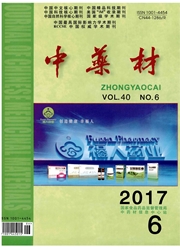

 中文摘要:
中文摘要:
目的:研究土壤因子对珠子参药材质量的影响,筛选影响珠子参药材质量的土壤主导因子。方法:测定不同产地珠子参皂苷类有效成分含量,以及相应生长地土壤养分和重金属元素含量,运用相关性分析和逐步回归分析等统计方法分析土壤因子对珠子参药材质量的影响。结果:不同采集地珠子参的人参皂苷Ro和竹节参皂苷Ⅳa含量均存在差异,对应的土壤养分和重金属矿质元素含量也存在差异。珠子参人参皂苷Ro含量与其生长土壤p H值呈显著正相关(P〈0.05)、与速效N呈极显著负相关(P〈0.01);竹节参皂苷Ⅳa含量与其生长土壤p H值呈极显著正相关(P〈0.01)、与速效N呈显著负相关(P〈0.05)、与矿质重金属元素Cu呈显著正相关(P〈0.05)。结论:土壤因子是影响珠子参药材质量的重要因素,土壤p H值和速效N含量可能是影响珠子参药材质量土壤主导因子。
 英文摘要:
英文摘要:
Objective: To research and screen the soil factors which influenced the quality of Panacis Majoris Rhizoma. Methods: By determining the effective constituent of saponin of Panacis Majoris Rhizoma from different habitats,and the soil nutrient and heavy metal content,using correlation analysis,stepwise regression analysis and other statistical methods to analyze the soil factors on the quality of Panacis Majoris Rhizoma. Results: The contents of ginsenoside Ro and chikusetsusaponin Ⅳ a of samples from different habitats were different,the corresponding soil nutrient and heavy metal content were also different. The content of ginsenoside-Ro was positively related with the soil p H value( P〈0. 01) and negatively related with the soil available N( P〈0. 05). The content of chikusetsusaponin Ⅳa was positively related with the soil p H( P〈0. 01) and copper content( P〈0. 05),and negatively with the soil available N( P〈0. 05). Conclusion: Soil factors are the leading factors that influence the quality of Panacis Majoris Rhizoma,soil p H and soil available N were the dominating factors.
 同期刊论文项目
同期刊论文项目
 同项目期刊论文
同项目期刊论文
 期刊信息
期刊信息
